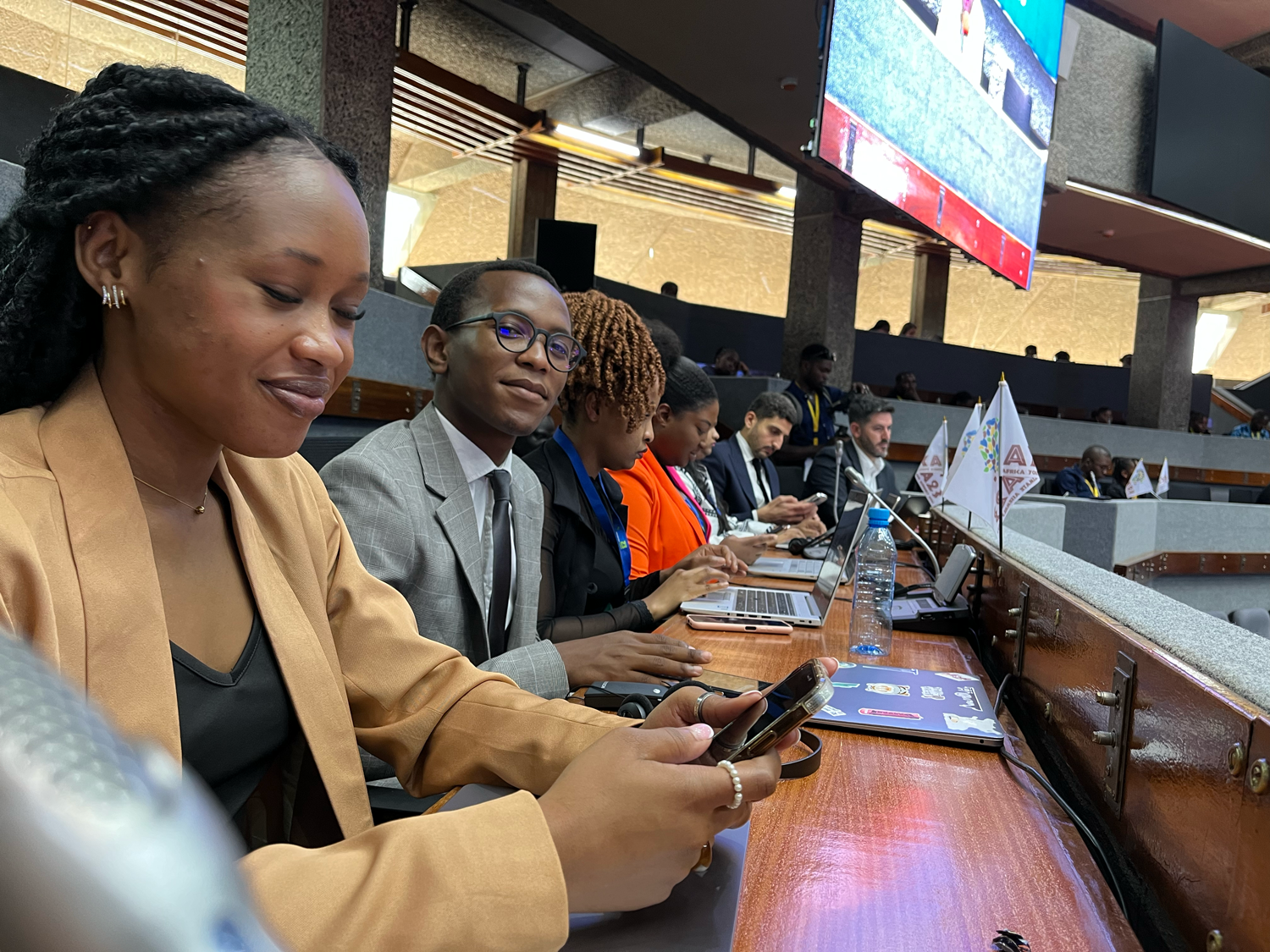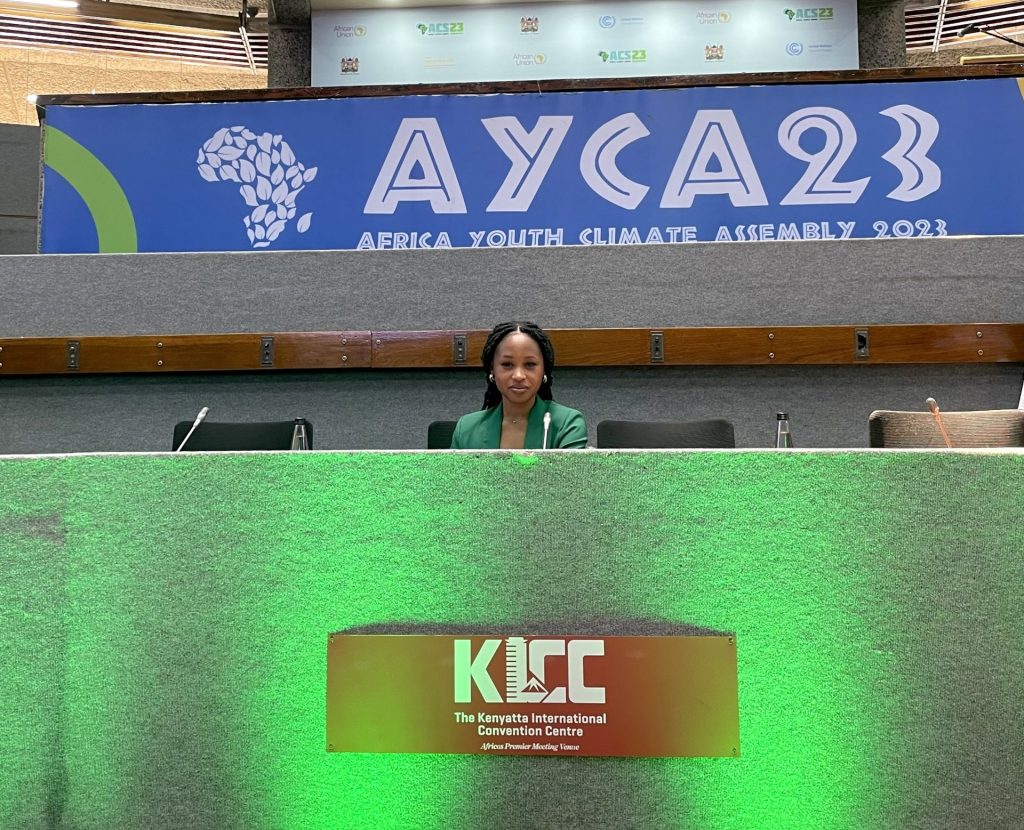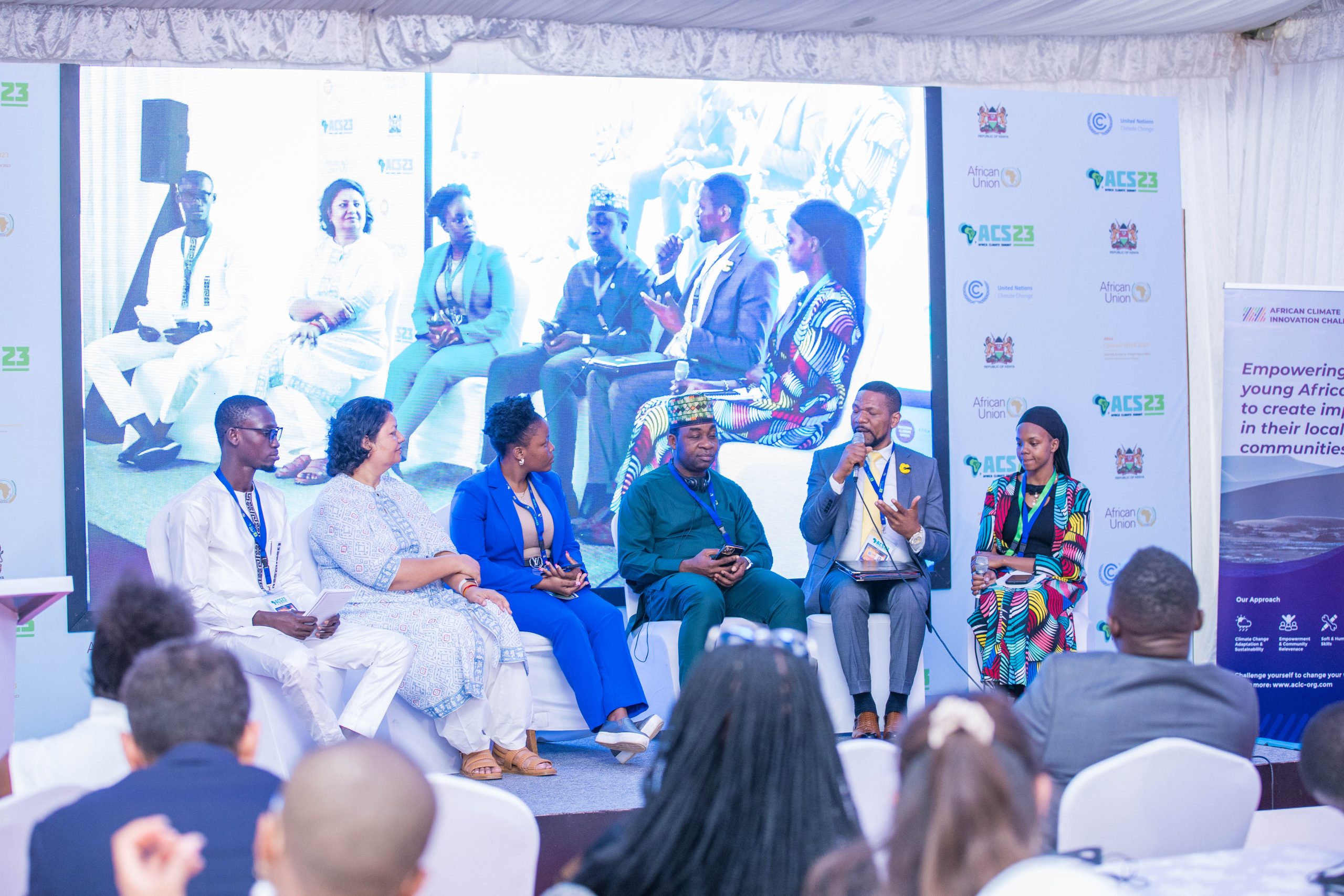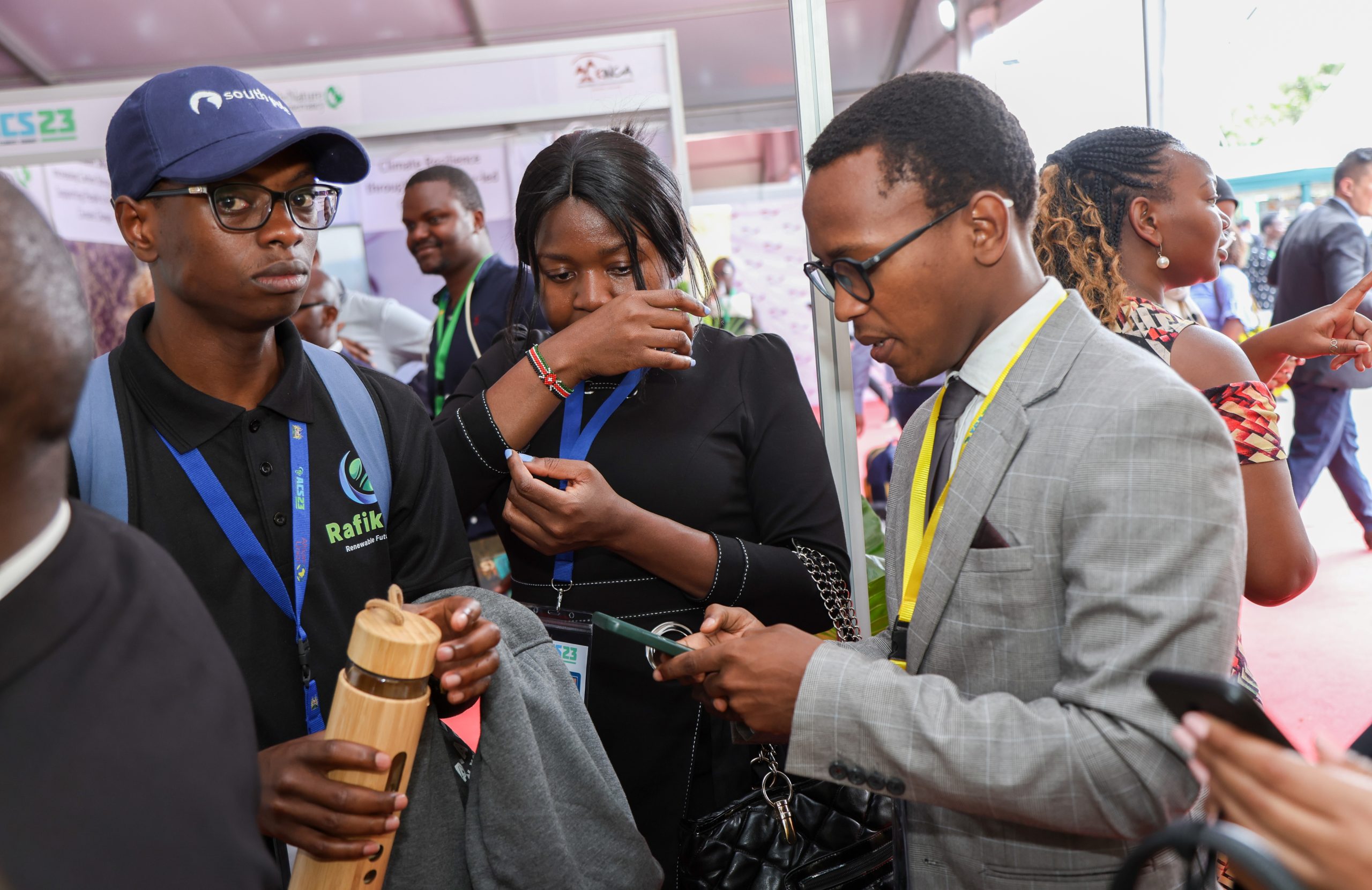
International Youth Climate Delegates, and Mariam Youth Climate Champion team at YCC booth
Empowering Africa's Youth for a Greener Tomorrow: Insights from the African Youth Climate Assembly & Africa Climate Week
“By nurturing and supporting these bright minds, we aren’t just addressing the challenges of our time; we are laying the groundwork for a future that is both sustainable and resilient, one that benefits all inhabitants of our precious planet”
As the world grapples with the escalating challenges of climate change, Africa is emerging as a beacon of hope and innovation. The recent African Youth Climate Assembly, hosted by the African Development Bank (AfDB), and the Africa Climate Summit (both making up the Africa Climate Week) brought together young minds from across the continent to discuss critical issues and explore innovative solutions for a sustainable future. As a representative of the IYCDP program under the COP28 Presidency, this experience afforded me an invaluable opportunity to participate actively. This blog post delves into the essential lessons and enlightening perspectives from this remarkable gathering.
Summary of Experience at AYCA & ACW
My experience at the Africa Youth Climate Assembly and the broader Africa Climate Week was inspiring. It was a gathering of passionate individuals from diverse backgrounds, all united by a shared commitment to addressing the pressing issue of climate change in Africa. The remarkable potential within Africa, especially among its youth, became abundantly clear during this event.
The assembly and week-long summit was a powerful showcase of youth-led innovation. I witnessed countless young minds brimming with fresh ideas and creative solutions to tackle climate challenges. These innovative approaches were inspiring and underscored the vitality of involving the youth in shaping climate policies and strategies. Their energy and determination were contagious and offered a glimpse into the limitless possibilities that await if we empower the next generation.
While immersing myself in this incredible initiative, I encountered numerous young visionaries competing for about 20,000 in grants offered by Green Africa Youth Organization (GAYO) through the African Climate Innovation Challenge. These individuals brimmed with fresh ideas and innovative approaches to sustainable cooking, green infrastructure, marine conservation, and many more. Their enthusiasm and eagerness to tackle the daunting task of combating climate change were truly inspiring. Witnessing their ingenuity and resourcefulness was a profound reminder of the immense value of involving young voices in shaping climate policies and strategies.

What resonated most profoundly was these passionate individuals’ unwavering commitment to positively impacting our planet. Their dedication was infectious, and it was impossible not to be energized by their zeal. They were resolute in pursuing sustainability and environmental preservation, offering a tantalizing glimpse into the vast potential that awaits us if we continue to empower and invest in the next generation.
These young innovators didn’t merely possess a desire for change; they embodied it through their actions and initiatives. Their efforts in addressing today’s pressing climate challenges, be it through sustainable cooking practices, innovative green infrastructure projects, or vital marine conservation efforts, were a testament to their resolve.
By nurturing and supporting these bright minds, we aren’t just addressing the challenges of our time; we are laying the groundwork for a future that is both sustainable and resilient, one that benefits all inhabitants of our precious planet. These remarkable individuals have shown us that we can pave the way for a brighter, greener, and more promising tomorrow by harnessing their energy and passion.
Moreover, the events highlighted the critical importance of **collaboration**. Climate change knows no borders, and addressing it requires concerted efforts from individuals, communities, organizations, and governments across Africa and beyond. The Africa Climate Week fostered an environment where stakeholders could unite, exchange ideas, and forge partnerships that transcend geographical boundaries. This collaborative spirit emphasized that addressing climate change is a shared responsibility that demands collective action.
Witnessing the power of collaboration among young people at Africa Climate Week was genuinely remarkable. There were numerous instances of collective efforts throughout the event, including the vibrant YOUNGO Events and the inspiring Green Jobs Fair. These gatherings exemplified the spirit of unity and shared purpose that animated the entire week.
What struck me most was the recognition of the critical importance of collaboration in tackling the immense challenge of climate change. The impact of climate change knows no boundaries; it affects every corner of our planet. To confront this crisis effectively, we must come together—individuals, communities, organizations, and governments, not only within Africa but also beyond its borders.
The Africa Climate Week provided a unique platform for stakeholders from diverse backgrounds and regions to join forces. It was a space where ideas flowed freely, and partnerships were forged that transcended geographical limitations. This emphasis on collaboration sent a powerful message: addressing climate change is not the responsibility of one entity or nation alone; it is a shared duty that necessitates collective action.
The collaborative spirit permeating the event was a testament to the understanding that we are all together. We share a common planet and destiny regardless of our origins or affiliations. By working hand in hand, we can aspire to create a sustainable future that benefits us all. The Africa Climate Week served as a shining example of what can be achieved when we come together with a shared purpose and a commitment to safeguarding our planet for future generations.
The emphasis on investing in green jobs and skills was another key takeaway. As discussions unfolded, it became evident that Africa’s potential as a solutions powerhouse for climate action is undeniable. By nurturing a skilled workforce and creating job opportunities in the green sector, Africa can combat climate change and drive economic growth and prosperity. It’s a win-win scenario that underscores the interconnectedness of environmental and economic sustainability.
One notable session on investment in green jobs was “Creating A Supportive Policy Environment to Attract Green Foreign Direct Investment (FDI).” It delved into the importance of crafting policies that encourage and actively attract foreign investments into sustainable and eco-friendly projects. The discussions revolved around how the right policies can serve as a magnet for green FDI, thus paving the way for more green job opportunities.
Another engaging session addressed “Scaling High Leverage Ratio Instruments and Reducing the Cost of Capital through Blended Finance.” This discussion highlighted the innovative approaches and financial mechanisms that can significantly reduce the financial barriers to green projects. By combining public and private resources through blended finance, the session explored how we can make green investments more financially viable and create more green jobs.

Winifred Awinpoya Atanga posing for a pic
Breakdown of Sessions Attended
Decarbonizing Industries: The Role of Green Hydrogen – The discussion on energy scenarios for Africa emphasized the importance of decarbonizing industries, focusing on green hydrogen. Clean energy is a source of power and fuel that has minimal or no negative impact on the environment and human health. Unlike traditional fossil fuels such as coal, oil, and natural gas, which release greenhouse gases and air pollutants when burned, clean energy technologies produce energy while significantly reducing or eliminating harmful emissions. Examples include Solar Power, Wind Power, Geothermal Energy, Nuclear Energy, Biomass. This clean energy source holds tremendous promise for achieving net-zero emissions, mitigating climate risks, and powering sustainable development in Africa. It was clear that embracing green hydrogen is an efficient way to reach climate goals.
Highlighting the significance of education as a cornerstone of adaptation was a central theme during the assembly. While we recognize the importance of mitigation efforts, the discussions at the side events on advocacy and local inclusion underscored the transformative power of education. The exhibition center was abuzz with local innovations, many of which were focused on climate advocacy, demonstrating the pivotal role of education in Africa Climate Week.
One heartwarming moment featured Grace Stuart Ninsiima, a remarkable 9-year-old climate activist and author of the book “Little Earth Soldiers,” along with her dedicated team. They moved tirelessly through the event, spotlighting how children actively engage in climate education. Their presence served as a potent reminder that climate change already affects African communities, making education a vital tool in preparing people to adapt to these changes.
It’s abundantly clear that well-informed individuals are better equipped to face the challenges of climate change. By emphasizing the role of education in the ACW, we not only empower our communities to understand the issues but also equip them with the knowledge and tools needed to respond effectively to climate-related challenges. This holistic approach, which embraces education as a vital component, ensures that we’re not just mitigating the effects of climate change but also nurturing a resilient and informed generation capable of tackling these issues head-on.

Intergenerational Dialogue, Africa Climate Week
Other ACW sessions explored how we can actively blend Finance for Impact – The Africa Climate Summit addressed the critical issue of financing climate action. Speakers stressed the need to mobilize domestic and regional capital, implement projects urgently, align development aid spending, and institutionalize funding in the private sector. Unlocking Africa’s climate capital is essential for achieving lasting change.
The discussion on creating a supportive policy environment underscored the importance of blended finance and regional development banks in monitoring and increasing interest rates. Recognizing Africa’s natural capital and promoting climate finance were crucial steps toward a sustainable future.
Critical minerals emphasize the need for a gender-inclusive approach in clean energy transitions. It also highlighted Uganda’s efforts to combat child labor and engage state and non-state actors in responsible mineral extraction. Young people were recognized as key stakeholders in shaping a just energy transition.
Advocacy and accountability were recurring themes, with calls for transparency in the energy mining sector and long-term strategies for responsible mining practices. The role of non-state actors in promoting sustainable mining and the potential of carbon border adjustment mechanisms (CBAM) were also discussed.
A Just and Inclusive Energy Transition: Pursuing a just and clean energy transition requires strategic planning that prioritizes the needs of all stakeholders. This transition concerns energy and creating a more equitable and sustainable future.
The President of the African Development Bank, Akinwumi Adesina, delivered powerful statements during the assembly;
“Highlighting the significance of renewable energy resources in Africa, the urgent need to invest in youth, and the pivotal role job creation plays in building a sustainable and equitable future.” .

IYCD networking with other youths
The AYCA Youth Declaration – What did it highlight?
Amidst the vibrant discussions and impassioned exchanges at the Africa Climate Youth Assembly, a significant highlight emerged as the “Youth Declaration: A Blueprint for Action.” This comprehensive declaration presented a roadmap for tackling climate change in Africa, encompassing a range of critical priorities essential for the continent’s sustainable future.
One of the foremost priorities the Youth Declaration outlines is finance. Recognizing that financial resources are pivotal for implementing effective climate mitigation and adaptation strategies, the declaration emphasizes the need for increased investment in green initiatives, sustainable projects, and climate resilience efforts across the African continent. This financial commitment is seen as crucial in catalyzing transformative change.
Another vital aspect addressed in the declaration is education and training. It underscores the significance of equipping young Africans with the knowledge and skills needed to understand, combat, and adapt to the challenges posed by climate change. Education is a means of raising awareness and a powerful tool for nurturing a generation of climate-conscious individuals capable of driving innovative solutions.
Public awareness emerges as yet another critical pillar of the Youth Declaration. In an era characterized by the rapid dissemination of information, it highlights the importance of spreading awareness about climate change, its impacts, and the urgent need for action. A well-informed public is likelier to support and engage in sustainable practices and advocate for climate policies.
The Youth Declaration also strongly emphasizes entrepreneurship and job creation. It recognizes that innovative business ventures and green technologies can play a pivotal role in addressing climate challenges while fostering economic growth. The declaration aims to create a sustainable pathway for youth employment by promoting entrepreneurship and job opportunities in the green sector.
In essence, the Youth Declaration embodies a holistic approach to climate action in Africa, empowering young Africans with the tools, resources, and opportunities they need to contribute to sustainable development actively. It underscores the interconnectedness of these priorities and their collective potential to drive positive change. It emphasizes that a comprehensive strategy is essential to effectively combat climate change and secure a brighter future for the continent.
Best believe, the Africa Youth Climate Assembly and Africa Climate Week collectively showcased the untapped potential of Africa’s youth, the power of collaboration, and the importance of investing in sustainable solutions. Africa can lead the way in building a greener and more prosperous future for all its people. Fostering innovation, strengthening partnerships, and committing to sustainable policies and investments are imperative to realize this potential. With the right approach, Africa can become a beacon of hope and a model for effective climate action on a global scale.
Winifred Awinpoya Atanga is an International Climate Delegate, a program of the COP28 Presidency in partnership with YOUNGO. She completed her BSc in Global Challenges, specializing in Energy, Sustainability, and Development at the African Leadership University, and is looking towards venturing into the Energy and Climate Policy field. Winifred’s ambitions are firmly directed toward entering the dynamic Energy and Climate Policy realm. As a recent graduate, she eagerly explores career prospects within her expertise.